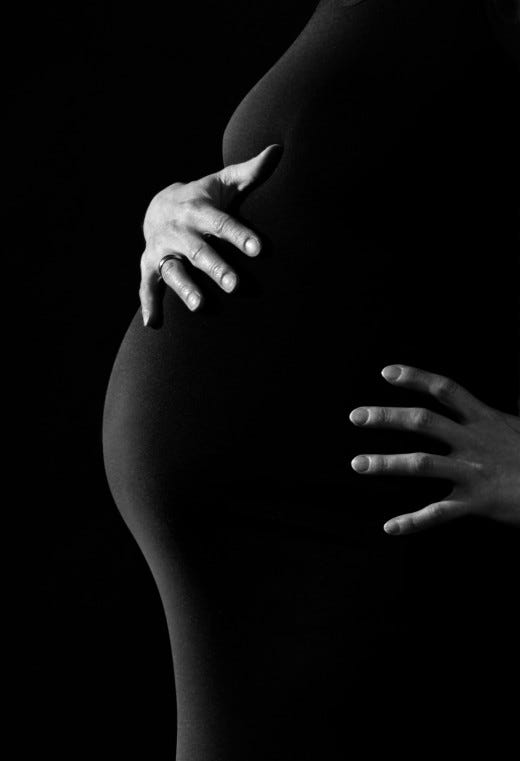When An Adoptee Gives Birth

From an adoptee perspective, the head may well understand the reasons behind relinquishment, and some will, I sincerely hope, be able to find a place inside themselves of non-judgement and compassion for the biological mother despite the culture around us which allows us only certain expressions and no others. Of course the head can comprehend the reasoning behind our adoption and the fact that in some cases, mine included, we are absolutely ‘better off’ with the adoptive parents.
But the heart never stops yearning, and searching.
I have written about ‘Adoptee Fog’ and how adoptees will often be convinced that relinquishment has had no effect on their lives at all.
I can only speak from my own experience and say that for 47 years, I too thought that I was unscathed by being adopted. I didn’t stop to consider that the post-partum depression I suffered in varying degrees following my five births, could have something to do with the somatic reverberations back to my own arrival on the planet, and subsequent abandonment.
I use the word ‘abandonment’ without any judgement towards my dear birth mother who was also a victim of our separation, and without judgement towards ANY birth mothers, whatever their circumstances. I use the word ‘abandonment’ in honour of the infant who has no voice, and for whom this word is a accurate description of their circumstance.
Pregnancy and birth are supremely physical, spiritual and emotional rites of passage for both the mother and the baby, and nature prepares both in a very precise physiological and physical way for their new life together post-partum. Mother Nature is not wasteful, and growing a new human is a costly exercise in terms of time and energy so the design for post-birth attachment, nurturing and feeding is impeccable and rarely fails amongst mammalian species. Of course human mammals, with our large neocortex and our capability to overthink everything to the point of destruction, have departed too far away from the biological norm in our quest to make these events fit our cultural and social narrative.
This includes our ability to pretend that a human baby can be separated from their mother at birth with no consequence to them.
A human being grows cell by cell inside the body of their mother, over an average of 40 weeks before going through the most tumultuous journey with her, culminating in the most influential and seminal event of our lives. Our life inside our mothers prepares us for life outside. From her body, our body receives information about the levels of stress we should expect on the outside, the availability of food, and what that food will taste like. We learn the sounds of the voices of our mother and the people in her life. We live a little lifetime in there. It’s where our own body is built.
No one really knows exactly what starts the labour process, but there is a protein, released by the baby’s lungs when they are mature, that signals readiness to the mother’s body. Who can guess what other private communications we are in with her in our collaboration to bring our own soul into incarnation through the journey that she will never forget and that we will never consciously remember. We are born through her body by the movement of her most intimate parts, to the sound of her roar and the smell and taste of her blood. You think I can forget her? Is it the ultimate in disconnect that I can have gone through this with a person but in all my life on earth I never get to look into her eyes…that I can remember.
Once born, our innate reflexes allow us to crawl naked up her belly to her breast and once there, to find her nipple, to latch on and begin to suckle. Yes, a newborn can do this and will do this in the first hour after a birth where the mother was not heavily medicated or traumatised or anaesthetised or subsequently disturbed by weighing and washing and swaddling and all the other interference. The ever-present archetype of ‘The Journey’ begins here, I believe, if it didn’t already begin before conception. What a lost skill it is to sit witness to a mother and baby in this interaction, supporting her to support her baby’s mission to her breast, without our usual need to ‘help’ the ‘helpless’ baby to latch.
Her nipple will smell and taste of her. Her milk will taste of the foods she eats, like the amniotic fluid in which we have lived a mini-lifetime whilst we were constructed of those same foods. Everything is familiar, comforting, and ‘of me’. A continuum of love whilst we learn for the first time to experience hunger, cold, noise, whilst we learn to co-ordinate sucking, swallowing, breathing, whilst we recover from the ferocity of our birth.
I believe that healthcare providers need to ask mothers in the antenatal period if they were adopted. We know that adoption has an impact on mental health, and the experience of losing her own mother at birth may trigger somatic memories for her as she herself undergoes this rite of passage.

No comments
Post a Comment